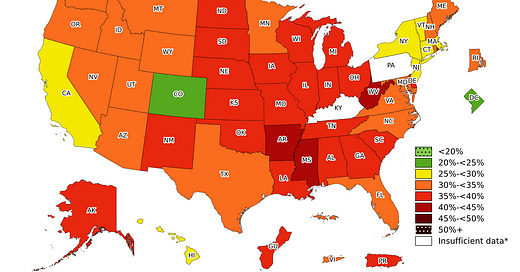The Make America Healthy Again (MAHA) Commission is anticiptated to release a report on chronic health soon. This assessment was ordered by the President in February and was required to be completed within 100 days.
Many are watching closely because the report is expected to take a deep dive into chronic health problems affecting children—conditions like asthma, diabetes, and other long-term illnesses. It will likely examine a wide range of possible causes, including diet, chemical exposures, medical treatments, pollution, radiation from technology and its use, and current government health policies.
While the report may raise important concerns—particularly related to safety and toxicology—it is equally important to examine how the information is presented and substantiated. I’d anticipate that it will include comparisons between the U.S. and other countries, especially in areas of children's health and preventive care.
While these comparisons can offer valuable perspectives, they sometimes risk presenting an imbalanced view that unfairly portrays the U.S. healthcare system and medical professionals in a negative light. This “America vs. the world” framing can encourage finger-pointing, misdirected blame, and public confusion.
Blame, especially when directed at individuals or institutions without nuance, tends to polarize rather than inform. It shifts the conversation away from constructive solutions and towards assigning fault, often creating adversarial dynamics between healthcare workers, policymakers, and the public.
In today’s climate, these narratives can also become politically charged, with different factions using healthcare critiques to advance ideological agendas rather than support meaningful reform. Instead of fostering collaboration or understanding, blame can deepen distrust, reinforce stereotypes, and make it harder to engage in productive dialogue. As such, it’s critical to assess whether the report fosters trust in healthcare professionals or inadvertently undermines confidence in medical expertise.
Keep in mind that this report is only a first step. The MAHA Commission is tasked with using this assessment as the foundation for a comprehensive plan to address childhood chronic disease. That full plan is expected later this summer in August.
What Should you Watch for in the Commission Report
Look to see if this report serves as a serious, evidence-based public health blueprint, or will it be repackaged wellness buzzwords.
First and foremost, examine the science. A credible health report must rest on robust evidence not on vague claims about “toxins,” or alarmist warnings about modern medicine and technologies. Look for the data, if it exists. Recommendations that diverge from established consensus by trusted institutions like the CDC or NIH should raise immediate concerns. Watch for any language that sounds more like ideologies, marketing slogans, or sound medical advice.
Next, consider the report’s focus. Does it propose meaningful, systemic solutions. Does it invest in preventive care, improving environmental health, increased access to medical care, and nutritious food? Or does it place responsibility on individuals without addressing the broader social and economic factors?
Another critical consideration is this: who ultimately benefits from the report’s recommendations? Genuine public health policies should prioritize the public above all else, emphasizing evidence-based interventions. If the report leans heavily on rhetoric centered around “medical freedom,” appeals to nature, anti-regulatory sentiment, or promotes deregulation at the expense of established safety measures—while casting unwarranted doubt on vaccines or discrediting healthcare professionals as reliable sources of scientific information—it may be placing ideology above evidence.
Litigation
In a climate of economic stress, families already struggle with rising healthcare costs, limited access to care, and financial uncertainty. We cannot afford policies shaped by misinformation or misplaced mistrust. While legal accountability for industry misconduct is a cornerstone of public health protection, indiscriminate support for litigation can carry consequences when driven by individuals with clear conflicts of interest.
Robert F. Kennedy Jr., for example, has legal and financial ties to firms like Wisner Baum, actively involved in high-profile litigation related to vaccines, heavy metals, and pesticides. While some of these cases may raise legitimate concerns, the broader strategy of amplifying fear, eroding trust in regulatory agencies, and promoting scientifically unsupported claims only leads to expensive legal battles that ultimately shift costs onto consumers. These also strain the legal system, and distract from evidence-based reforms that effectively safeguard public health.
In this context, it is essential to ask whether advocacy is truly in the public interest—or if it primarily serves the interests of the report authors, litigators, and aligned influencers. If the loudest proponents of the report include social media personalities, supplement marketers, or litigators with vested interests, it becomes all the more important to scrutinize whose agendas are being promoted—and whether they truly serve the public good.
Ultimately, health is not a partisan issue—it’s a shared responsibility that impacts us all. As the MAHA Commission releases its report, it’s important to approach it with a steady hand and avoid knee-jerk reactions. A thoughtful, scientific critique grounded in evidence and professional integrity will be essential to navigating the findings and recommendations. If the report falls short of expectations, experts and advocates must engage constructively—asking rigorous questions without resorting to alarmism or dismissal.
In closing, let’s approach the upcoming report with a clear and balanced perspective, recognizing its potential to shape important conversations about the future of children’s health. Take the time to listen, reflect, and seek out credible information before drawing conclusions.
Stay thoughtful, stay curious—and above all, stay safe out there.












Share this post